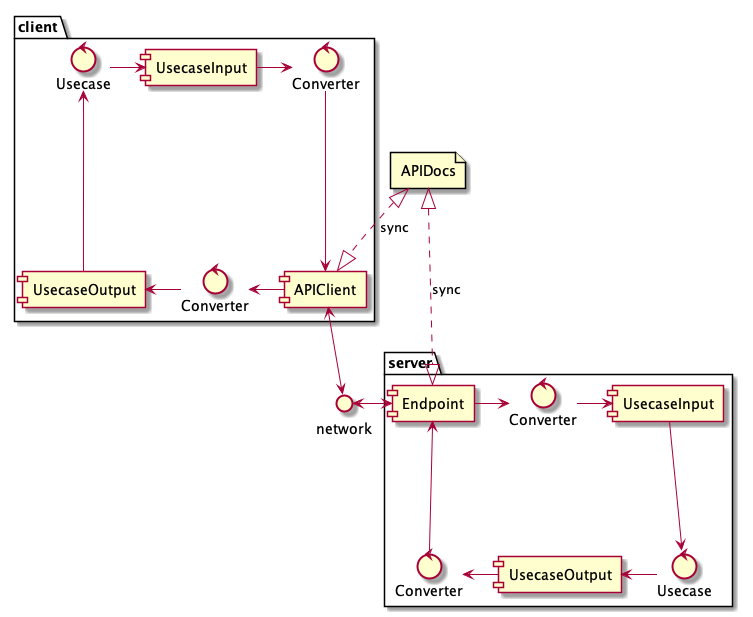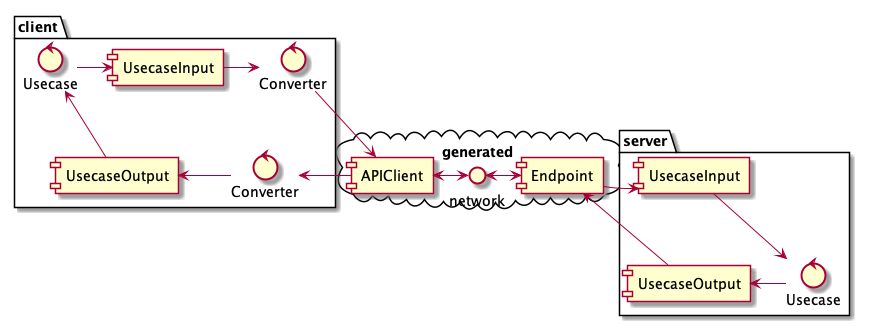go-codegen
go-codegen is a generator library for Go.
go-codegen mainly generates codes for Domain Driven Development.
Generator Types
Currently, go-codegen provides three generation types.
Type1: Generation by Definition of Struct
Like followings.
//go:generate go-codegen go_accessor
//go:generate go-codegen go_constructor
//genconstructor
type Person struct {
id string `required:"" getter:""`
name string `required:"" getter:"" setter:"Rename"`
tags []string `getter:"" setter:""`
text encoding.TextMarshaler `getter:"" setter:""`
createdAt time.Time `required:"time.Now()"`
}// Code generated by go-codegen go_accessor; DO NOT EDIT.
package example
import (
"encoding"
"time"
)
func NewPerson(
id string,
name string,
) Person {
return Person{
id: id,
name: name,
createdAt: time.Now(),
}
}
func (m Person) ID() string {
return m.id
}
func (m Person) Name() string {
return m.name
}
func (m *Person) Rename(s string) {
m.name = s
}
func (m Person) Tags() []string {
return m.tags
}
func (m *Person) SetTags(s []string) {
m.tags = s
}
func (m Person) Text() encoding.TextMarshaler {
return m.text
}
func (m *Person) SetText(s encoding.TextMarshaler) {
m.text = s
}Type2: Generation from Definition of Simple Type Definition
Like followings.
package example
import "errors"
//go:generate go-generror Unknown BadRequest PermissionDenied NotFound
type NameSpec struct {
lessThan int
moreThan int
}
func (s NameSpec) Validate(name string) Error {
//errcode NameIsInvalidLength,lessThan int,moreThan int
if len(name) >= s.lessThan || len(name) <= s.moreThan {
return ErrorBadRequest(errors.New("invalid name"), NameIsInvalidLengthError(s.lessThan, s.moreThan))
}
return nil
}// Code generated by go-codegen error go_definition; DO NOT EDIT
package example
import (
"fmt"
"strconv"
"strings"
"github.com/hori-ryota/zaperr"
"go.uber.org/zap"
"go.uber.org/zap/zapcore"
)
type ErrorCode string
const (
errorUnknown ErrorCode = "Unknown"
errorBadRequest ErrorCode = "BadRequest"
errorPermissionDenied ErrorCode = "PermissionDenied"
errorNotFound ErrorCode = "NotFound"
)
func (c ErrorCode) String() string {
return string(c)
}
type Error interface {
Error() string
Details() []ErrorDetail
IsUnknown() bool
IsBadRequest() bool
IsPermissionDenied() bool
IsNotFound() bool
}
func newError(source error, code ErrorCode, details ...ErrorDetail) Error {
return errorImpl{
source: source,
code: code,
details: details,
}
}
func ErrorUnknown(source error, details ...ErrorDetail) Error {
return newError(source, errorUnknown, details...)
}
func ErrorBadRequest(source error, details ...ErrorDetail) Error {
return newError(source, errorBadRequest, details...)
}
func ErrorPermissionDenied(source error, details ...ErrorDetail) Error {
return newError(source, errorPermissionDenied, details...)
}
func ErrorNotFound(source error, details ...ErrorDetail) Error {
return newError(source, errorNotFound, details...)
}
type errorImpl struct {
source error
code ErrorCode
details []ErrorDetail
}
func (e errorImpl) Error() string {
return fmt.Sprintf("%s:%s:%s", e.code, e.details, e.source)
}
func (e errorImpl) Details() []ErrorDetail {
return e.details
}
func (e errorImpl) IsUnknown() bool {
return e.code == errorUnknown
}
func (e errorImpl) IsBadRequest() bool {
return e.code == errorBadRequest
}
func (e errorImpl) IsPermissionDenied() bool {
return e.code == errorPermissionDenied
}
func (e errorImpl) IsNotFound() bool {
return e.code == errorNotFound
}
type ErrorDetail struct {
code ErrorDetailCode
args []string
}
func newErrorDetail(code ErrorDetailCode, args ...string) ErrorDetail {
return ErrorDetail{
code: code,
args: args,
}
}
func (e ErrorDetail) String() string {
return strings.Join(append([]string{e.code.String()}, e.args...), ",")
}
func (c ErrorDetail) Code() ErrorDetailCode {
return c.code
}
func (c ErrorDetail) Args() []string {
return c.args
}
type ErrorDetailCode string
func (c ErrorDetailCode) String() string {
return string(c)
}
const ErrorDetailNameIsInvalidLength ErrorDetailCode = "NameIsInvalidLength"
func NameIsInvalidLengthError(
lessThan int,
moreThan int,
) ErrorDetail {
return newErrorDetail(
ErrorDetailNameIsInvalidLength,
strconv.FormatInt(int64(lessThan), 10),
strconv.FormatInt(int64(moreThan), 10),
)
}
func (e errorImpl) MarshalLogObject(enc zapcore.ObjectEncoder) error {
zaperr.ToNamedField("sourceError", e.source).AddTo(enc)
zap.String("code", string(e.code)).AddTo(enc)
zap.Any("details", e.details)
return nil
}- go-codegen/codegen/error
- Generator for type safe error
- go-codegen/codegen/error/go_definition
- Definition of Go
- TODO: support ProtocolBuffers definition
- TODO: support JsonType definition
- TODO: Generator for application events
- Rewrite from hori-ryota/go-genappevent
Type3: Generation for "Adapter Layer" from "Application Layer" Definition
For example, in the adapter for communication API, like followings.
Before:
After:
- go-codegen/codegen/api
- go-codegen/codegen/api/protobuf
- Generate
.protodefinition - go-codegen/codegen/api/protobuf/go_server
- go-codegen/codegen/api/protobuf/go_server/httprpc
- Generate HTTP Server for RPC with proto
- go-codegen/codegen/api/protobuf/go_server/httprpc
- go-codegen/codegen/api/protobuf/go_client
- go-codegen/codegen/api/protobuf/go_client/httprpc
- Generate HTTP Client for RPC with proto
- go-codegen/codegen/api/protobuf/go_client/structdef
- Generate struct definitions for HTTP Client for RPC with proto
- go-codegen/codegen/api/protobuf/go_client/httprpc
- go-codegen/codegen/api/protobuf/kotlin_client
- go-codegen/codegen/api/protobuf/kotlin_client/httprpc
- Generate HTTP Client for RPC with proto in Kotlin
- go-codegen/codegen/api/protobuf/kotlin_client/structdef
- Generate struct definitions for HTTP Client for RPC with proto in Kotlin
- go-codegen/codegen/api/protobuf/kotlin_client/httprpc
- go-codegen/codegen/api/protobuf/bufgenyaml - Generate Yaml config file for buf generate
- Generate
- Sample: go-codegen/codegen/api/internal/testdata
- go-codegen/codegen/api/protobuf

